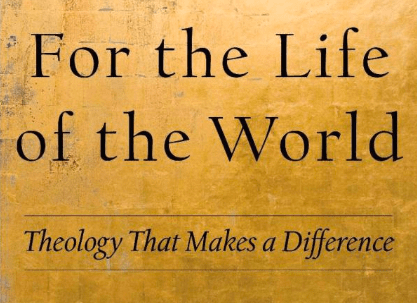When theology is reframed for a flourishing, a kingdom life what does it look like?
Miroslav Volf and Matthew Croasmun, in For the Life of the World, present a sketch of an answer in their last chp under two major categories: form and content. We look at content but here’s a summary statement:
… the Christian faith offers a specific account of the character of the transcendent realm and how it relates to the mundane, a particular vision of God and the relation between God and the world: (1) the mundane realm has its origin in the God of love (creation); (2) having become captive to Sin. human beings live as if they and the world they inhabit were other than they truly are (sin); (3) nevertheless, the God of love has come to inhabit the mundane realm (incarnation and salvation) and (4) the mundane realm has its telos in the “new Jerusalem, the city of the one true God, the full realization of which lies in the eschatological future (consummation).
They find a thematic vision of the Christian life in Romans 14:17: “For the kingdom of God is not food and drink but righteousness and peace and joy in the Holy Spirit.” Thus, it’s about a life led well, going well, and feeling as it should.
Led well: “righteousness” or “justice.” “That is, when Paul talks about dikaiosyne with respect to us, he refers, of course, not only to our lack of righteousness, but also to the ideal of a righteous or just way of life.” Thus, “righteousness is fidelity to the covenant.” That covenant is the law of love. This is something that can be done/acted upon always. They factor in inaugurated eschatology:
As a life coming to be in the midst of a world that is, in part, unfitting to it, the proleptic flourishing life is often marked by a love that suffers. If consummated flourishing agency is marked by perfect reciprocity, cooperation, and unity of purpose, penultimate flourishing agency aims at this cooperation and unity in service of love, and yet lives aware that love will elicit opposition under the unfitting conditions of this life.
Love resists injustice and is suspicious of power.
Life going well: “peace.” A big term in the Bible and transcends inner, personal peace. It is the “world set right.” The whole world right with God, then, is the big picture and that kind of peace generates personal and interpersonal and creational peace — with God and others.
Life feeling as it should: “joy.” A theme often ignored in NT theologies, but one that plays a big role in the theology of Paul. (Over all this book could do more with the teachings and life of Jesus.) The major object of joy is God and God’s presence as well as others.
All of this is fleshed out through inaugurated eschatology: so love, peace and joy are partially realized and thus there is suffering and lament and resistance in the meantime.
The flourishing life is Gift: “in the Holy Spirit.” So crucial here. I’ve heard many stop before they got to this and turned this verse into nothing but modern social ethics. This turns the whole into redemption.
These three are interdependent.
Exceptional book. A precis of what is to come!












